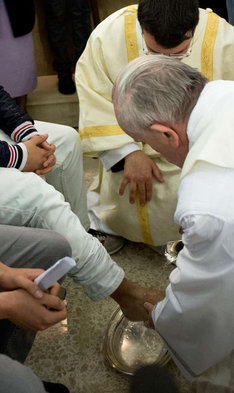Details from AP:
The Vatican on Friday (March 29) dismissed criticism of Pope Francis’ decision to wash the feet of two women during a Maundy Thursday Mass at a Rome youth prison.
The move has come under fire from Catholic traditionalists who say that the rite is a re-enactment of Jesus washing the feet of the 12 apostles before his death, and thus should be limited only to men.
Traditionally, popes have washed the feet of 12 priests during a solemn Mass in Rome’s St. John Lateran Basilica…
…The Vatican’s chief spokesman, the Rev. Federico Lombardi, said the pope’s decision was “absolutely licit” for a rite that is not a church sacrament. Francis also took into account “the real situation, the community where one celebrates,” Lombardi added.
The Casal del Marmo prison where Francis celebrated houses both young men and women, “and it would have been strange if girls had been excluded,” Lombardi said.
“This community understands simple and essential things; they were not liturgy scholars,” Lombardi said. “Washing feet was important to present the Lord’s spirit of service and love.”
A document issued by the U.S. Conference of Catholic Bishops says that the inclusion of women in the foot-washing rite is an “understandable way of accentuating the evangelical command of the Lord,’who came to serve and not to be served,’ that all members of the church must serve one another in love.”
The bishops’ document continues, “It has become customary in many places to invite both men and women to be participants in this rite in recognition of the service that should be given by all the faithful to the church and to the world.”
Meantime, canon lawyer Ed Peters takes a look at what’s involved here:
1. If liturgical law permitted the washing of women’s feet at the Mass of the Lord’s Supper, no one would have noticed the pope’s doing it. What was newsworthy (apparently, massively newsworthy) is that, precisely because liturgical law does not authorize it, the pope’s performance of the action was huge news.
2. I and many others have long been open to revising the Mandatum rite so as to permit the washing of women’s feet although I understand that strong symbolic elements are in play and I might be under-appreciating arguments for the retention of the rite as promulgated by Rome. I take no position on that larger issue, it being ultimately a question for experts in other disciplines. My focus is on the law as issued by Rome (c. 838).
3. Few people seem able to articulate when a pope is bound by canon law (e.g., when canon law legislates matters of divine or natural law) and when he may ignore it (e.g., c. 378 § 1 on determining the suitability of candidates for the episcopate or appointing an excessive number of papal electors contrary to UDG 33). Those are not hard cases. Most Church laws, however, fall between these two poles and require careful thinking lest confusion for—nay, dissension among—the faithful arise. Exactly as happened here. Now, even in that discussion, the question is not usually whether the pope is bound to comply with the law (he probably is not so bound), but rather, how he can act contrary to the law without implying, especially for others who remain bound by the law but who might well find it equally inconvenient, that inconvenient laws may simply be ignored because, well, because the pope did it.
4. A pope’s ignoring of a law is not an abrogation of the law but, especially where his action reverberated around the world, it seems to render the law moot. For the sake of good order, then, the Mandatum rubrics should be modified to permit the washing of women’s feet or, perhaps upon the advice of Scriptural and theological experts, the symbolism of apostolic ministry asserted by some to be contained in the rite should be articulated and the rule reiterated. What is not good is to leave a crystal clear law on the books but show no intention of expecting anyone to follow it. That damages the effectiveness of law across the board.
In response to the many questions and concerns raised over Pope Francis washing the feet of 12 young people at the Roman Juvenile Detention Centre on Holy Thursday evening, especially that two were young women, Fr. Lombardi has sent me the following information to be shared with you.
One can easily understand that in a great celebration, men would be chosen for the foot washing because Jesus, himself washing the feet of the twelve apostles who were male. However the ritual of the washing of the feet on Holy Thursday evening in the Juvenile Detention Centre in Rome took place in a particular, small community that included young women. When Jesus washed the feet of those who were with him on the first Holy Thursday, he desired to teach all a lesson about the meaning of service, using a gesture that included all members of the community.
We are aware of the photos that show Cardinal Jorge Bergoglio, then-Archbishop of Buenos Aires, who in various pastoral settings washed the feet of young men and women. To have excluded the young women from the ritual washing of feet on Holy Thursday night in this Roman prison, would have detracted our attention from the essence of the Holy Thursday Gospel, and the very beautiful and simple gesture of a father who desired to embrace those who were on the fringes of society; those who were not refined experts of liturgical rules.
That the Holy Father, Francis, washed the feet of young men and women on his first Holy Thursday as Pope, should call our minds and hearts to the simple and spontaneous gesture of love, affection, forgiveness and mercy of the Bishop of Rome, more than to legalistic, liturgical or canonical discussions.












